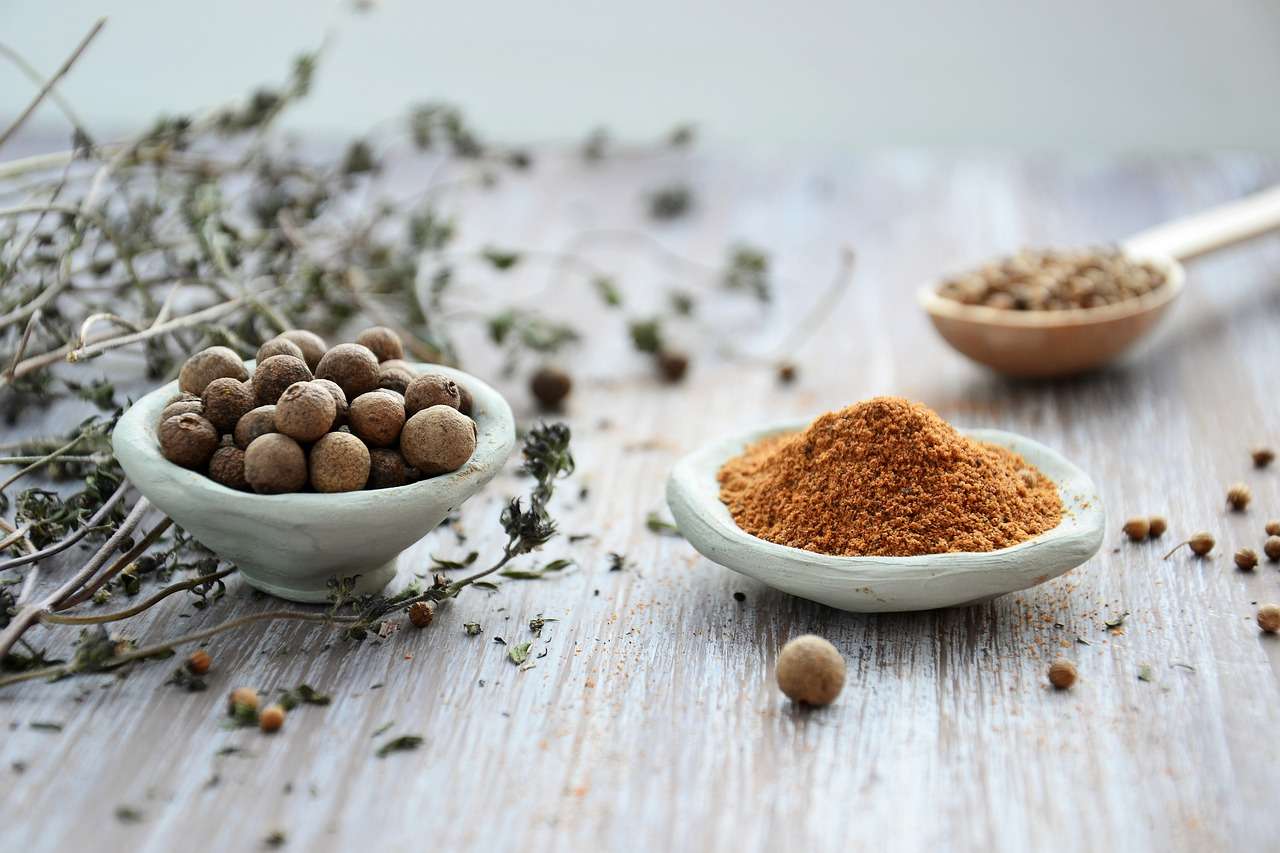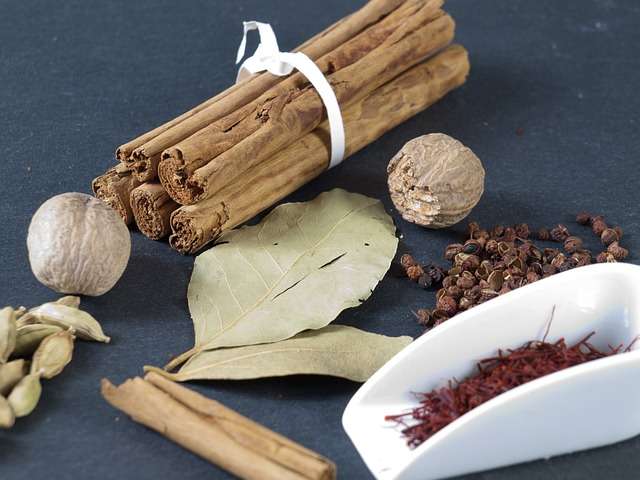Introduction:
The seeds of the Myristica fragrans tree, which is native to the Banda Islands of Indonesia but is also grown in other tropical regions of the world, are used to make the spice nutmeg. The nutmeg tree yields nutmeg seeds as well as mace, a different spice made from the seed’s scarlet shell.

Since ancient times, nutmeg and mace have both been utilized in food preparation and medicine. Many nations have used nutmeg as a traditional medicine because of nutrition facts of nutmeg in the past. It has been used to cure a number of illnesses and to help with digestion and nausea relief.
Nutmeg should be used sparingly, though, as too much of it might have negative consequences.
Nutrition Facts of Nutmeg:
Due to its powerful flavor and potential for negative consequences, if ingested in excess, nutmeg is often used carefully when cooking.
Its nutritional value to the dish is therefore only marginal. The nutritional profile of 1 teaspoon (or 2.3 grams) of nutmeg is listed below:
Calories
Nutmeg has around 12 calories per teaspoon. As a result, it has a low-calorie count, which implies it doesn’t add many calories to the dish as a whole.
Serving Size
Due to its strong flavor, nutmeg is typically used in recipes in quantities of no more than a teaspoon. It serves more as a flavoring than as a significant food source.

Macronutrients
• carbs: One teaspoon of nutmeg has roughly 1.5 grams of carbs. These carbs mostly consist of natural sugars and dietary fiber.
• Protein: Less than 0.1 grams of protein per teaspoon can be found in nutmeg.
• Fat: The average amount of fat in a teaspoon of nutmeg is less than 0.5 grams. Rather than being a source of fat, it is mostly a flavoring.
Vitamins
• Vitamin A: A teaspoon of ground nutmeg contains around 1% of the daily required amount of vitamin A. Maintaining good vision and skin needs vitamin A.
• Vitamin C: Nutmeg has very little vitamin C in it.
• Vitamin K: Nutmeg includes trace levels of vitamin K, which is necessary for healthy blood coagulation and bones.
Minerals
• Calcium: Less than 1% of the daily required dose of calcium is provided by one teaspoon of nutmeg. Calcium is necessary for strong bones and healthy muscles.

• Iron: Each teaspoon of nutmeg provides around 1% of the daily recommended intake for iron. The blood’s ability to carry oxygen depends on iron.
• Magnesium: A teaspoon of nutmeg provides less than 1% of the daily recommended intake for this mineral. Magnesium is necessary for the health of the muscles and nerves as well as other bodily processes.
Health Benefits of Nutmeg:
Due to its special components and qualities, moderate nutmeg use may provide many possible health advantages due to nutrition facts of nutmeg.
It’s critical to remember that although these advantages seem promising, additional research is necessary to properly comprehend the impact of nutmeg on health.
The following are some purported health advantages of nutmeg consumption:

-
Anti-inflammatory Properties
Myristicin and elemicin, two substances found in nutmeg, have been researched for their potential to reduce inflammation. It is very important to consume nutmeg in moderation, as excessive consumption might have negative effects.
These components may help reduce inflammation in the body, perhaps beneficial for ailments like arthritis or other inflammatory disorders.
-
Anti-oxidant Effects
Antioxidants included in nutmeg, such as phenolic compounds, can aid in the body’s ability to combat damaging free radicals. Antioxidants are essential for preventing oxidative stress in cells and can improve general health.
-
Digestive Benefits
Nutmeg has long been employed as a digestive aid. Bloating, gas, and indigestion can all be relieved by it. Some individuals include nutmeg in herbal medicines to soothe upset stomachs.
-
Potential Antimicrobial Properties
Myristicin, a molecule found in nutmeg, has demonstrated some antibacterial capabilities in laboratory trials; although further research is required to validate these benefits and their relevance to human health, these qualities may help fight various bacteria and fungi.
-
Nutmeg’s Role in Traditional Medicine
The use of nutmeg in traditional medical practices dates back to ancient times all across the world. It has been employed for a number of things, such as:

• Pain relief: Nutmeg has been used for centuries to soothe aches and pains, such as headaches and muscular aches.
• Insomnia and anxiety: Nutmeg is used to enhance sleep and lessen anxiety in some cultures, but it should be used cautiously owing to possible negative effects.
• Respiratory health: Nutmeg is used in traditional medicine to treat respiratory issues like colds and coughing.
How to incorporate nutmeg into your diet:
Nutmeg may provide a range of foods with a toasty, aromatic flavor that you can add to your diet. Here are some recipes that you may make with nutmeg:
Baking: Cake, cookie, pie, and bread recipes frequently call for nutmeg, a prominent component in baking. Fruits like apples and pears go particularly well with it. For a delicious flavor, you can add a small amount of ground nutmeg to your batter.
Desserts: Nutmeg is a key component in many dessert recipes. For an additional layer of taste, think about dusting freshly chopped nutmeg over desserts like custard, rice pudding, or ice cream.
Coffee and hot beverages: Nutmeg can make coffee, hot chocolate, or tea taste better. For a subtle kick of heat, nutmeg can be added in very small amounts.
Smoothies: You can use nutmeg to give your morning smoothie more depth. To give smoothies containing components like banana, yogurt, and honey a distinctive touch, try sprinkling some nutmeg on top.
Soups and stews: Nutmeg is a good complement to savory foods. It can improve the flavor of creamy soups like potato leek or butternut squash soup. When cooking or serving as a garnish, sprinkle on some ground nutmeg.
FAQs:
1. Can I swap nutmeg for mace in recipes?
Despite coming from the same tree, nutmeg and mace have different flavors, so it’s best to recommend using them in recipes.
2. Is nutmeg safe to consume while expecting?
Nutmeg is generally safe when used in small amounts during pregnancy, but excessive consumption should be avoided.
3. What are the signs of nutmeg poisoning?
Nutrient poisoning symptoms can include nausea, vomiting, lightheadedness, and hallucinations.
4. Can freshly grated nutmeg be used in place of ground nutmeg?
Yes, but fresh nutmeg has a stronger flavor, so adjust the amount.
5. Can nutmeg cause nut allergies and is it a tree nut?
• Since nutmeg is not a tree nut, eating it rarely results in real nut allergies. For those with severe nut allergies, vigilance is suggested because cross-contamination is a possibility.
Conclusion:
Nutmeg, a versatile spice with a recognizable warm and aromatic flavor, is the final ingredient. Since ancient times, it has been included in both savory and sweet foods.
Although it should be used in moderation to avoid any unwanted effects, nutmeg also has anti-inflammatory and antioxidant qualities that may have health advantages because of the nutrition facts of nutmeg.
Although nutmeg has a long history of traditional medical use and can enhance the flavor of many recipes, it is crucial to utilize it with prudence. Nutmeg toxicity, which can result from excessive ingestion, can have unpleasant side effects.
